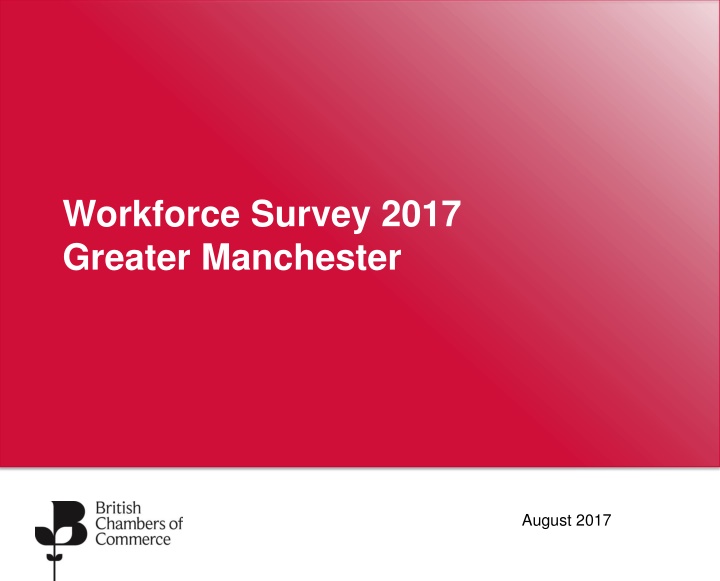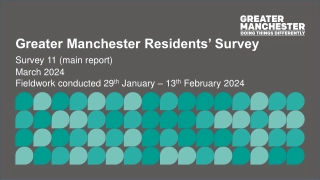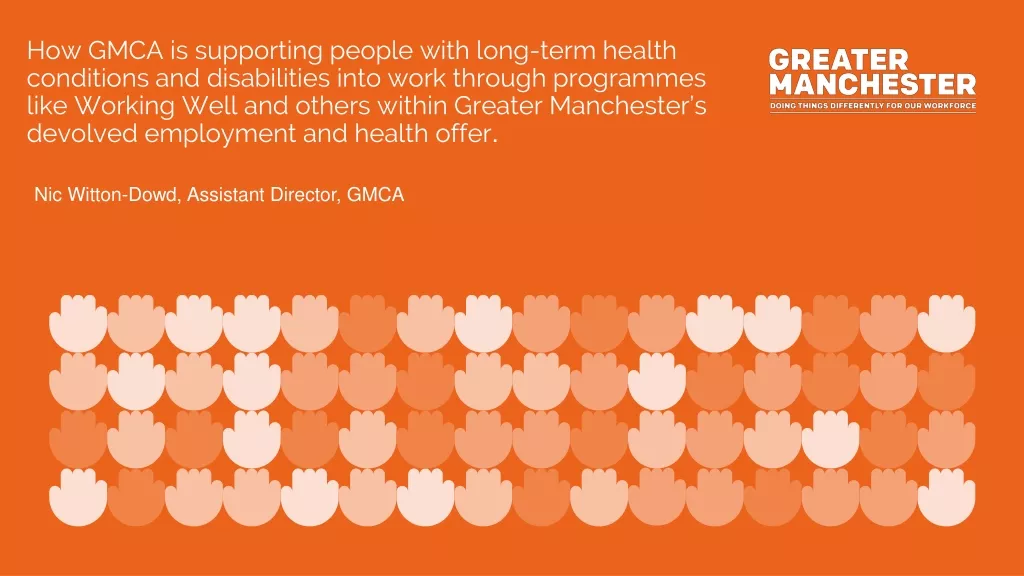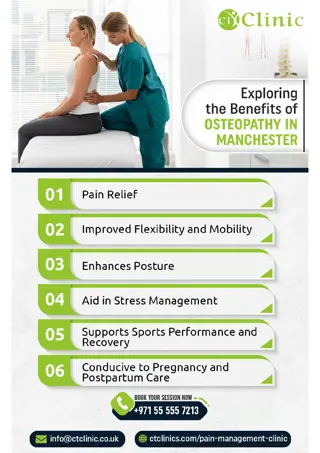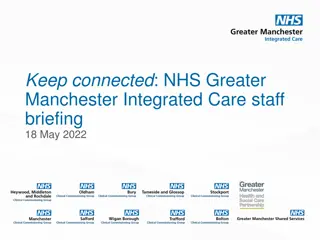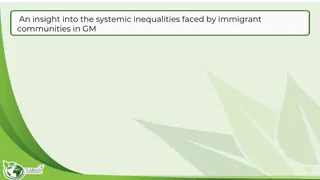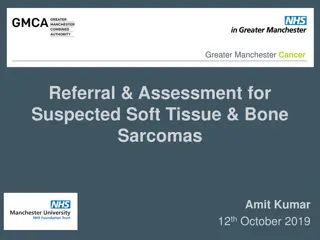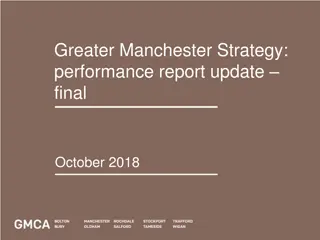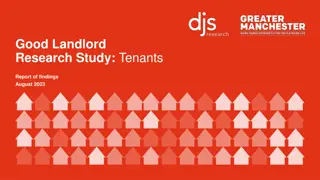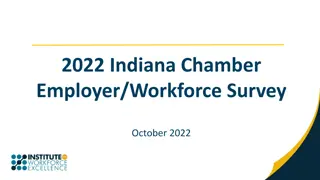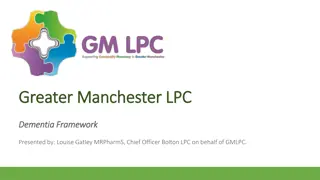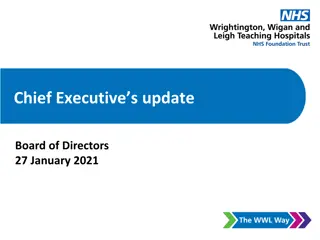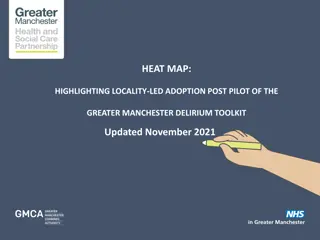Workforce Survey 2017 Greater Manchester
The workforce survey conducted in Greater Manchester in August 2017 reveals the impact of statutory changes on businesses' overall cost base. The data shows the percentage distribution of significant cost increases, slight cost increases, no cost changes, and uncertainty regarding the effects. Additionally, businesses are asked about their potential responses to future increases in the National Living Wage over the next three years.
Download Presentation

Please find below an Image/Link to download the presentation.
The content on the website is provided AS IS for your information and personal use only. It may not be sold, licensed, or shared on other websites without obtaining consent from the author.If you encounter any issues during the download, it is possible that the publisher has removed the file from their server.
You are allowed to download the files provided on this website for personal or commercial use, subject to the condition that they are used lawfully. All files are the property of their respective owners.
The content on the website is provided AS IS for your information and personal use only. It may not be sold, licensed, or shared on other websites without obtaining consent from the author.
E N D
Presentation Transcript
Workforce Survey 2017 Greater Manchester August 2017
[q8] Relative to your overall cost base, what impact have the following statutory changes had on your business? 0% 21% Significant increase in costs 48% Slight increase in costs No increase in costs Don't know 31% [q8] Relative to your overall cost base, what impact have the following statutory changes had on your business? Workforce Survey 2017 BASE: (Greater Manchester: N = 112)
[q8] Relative to your overall cost base, what impact have the following statutory changes had on your business? 4% 15% 17% Significant increase in costs Slight increase in costs No increase in costs Don't know 64% [q8] Relative to your overall cost base, what impact have the following statutory changes had on your business? Workforce Survey 2017 BASE: (Greater Manchester: N = 109)
[q8] Relative to your overall cost base, what impact have the following statutory changes had on your business? 5% 6% 19% Significant increase in costs Slight increase in costs No increase in costs Don't know 70% [q8] Relative to your overall cost base, what impact have the following statutory changes had on your business? Workforce Survey 2017 BASE: (Greater Manchester: N = 108)
[q8] Relative to your overall cost base, what impact have the following statutory changes had on your business? 3% 23% 20% Significant increase in costs Slight increase in costs No increase in costs Don't know 54% [q8] Relative to your overall cost base, what impact have the following statutory changes had on your business? Workforce Survey 2017 BASE: (Greater Manchester: N = 110)
[q10] What ways, if any, would your business respond to such increases in the National Living Wage over the next 3 years? Raise prices of products and services Reduce hours worked by staff Scale back recruitment Scale back investment/growth plans Redundancies Reduce staff benefits such as bonuses, overtime, etc. Reduce pay growth for staff Recruit more workers aged under 25 and/or apprentices Recruit workers on flexible working contracts (e.g. self- Reduce staff training budget Reduce pension contributions Increase investment in automation My business will not take any action Other, please specify 0% 5% 10% 15% 20% 25% 30% 35% 40% 45% 50% [q10] What ways, if any, would your business respond to such increases in the National Living Wage over the next 3 years? Workforce Survey 2017 BASE: (Greater Manchester: N = 111)
[q11] Does your firms pay bill exceed 3m? 3% 15% Yes No Don't know 82% [q11] Does your firm s pay bill exceed 3m? Workforce Survey 2017 BASE: (Greater Manchester: N = 112)
[q12] In the last 12 months, has your business recruited apprentices? Yes Don t know No No Yes Don t know 0% 10% 20% 30% 40% 50% 60% 70% [q12] In the last 12 months, has your business recruited apprentices? Workforce Survey 2017 BASE: (Greater Manchester: N = 111)
[q14] Do you expect to recover the Apprenticeship Levy amount spent by your company? I.e. by training sufficient apprentices to recoup the amount levied Yes, we expect to recover more than our Levy payment Yes, we expect to recover 100% of our Levy payment We expect to partially recover our Levy payment We don t expect to recover any of our Levy payment Have limited or no understanding of the Apprenticeship Levy Other, please specify 0% 5% 10% 15% 20% 25% 30% 35% 40% [q14] Do you expect to recover the Apprenticeship Levy amount spent by your company? I.e. by training sufficient apprentices to recoup the amount levied BASE: (Do you expect to recover the Apprenticeship Levy amount spent by your company? I.e. by training sufficient apprentices to recoup the amount levied: N = 16) Workforce Survey 2017
[q15] What changes, if any, will your business make as a direct response to the introduction of the Apprenticeship Levy? Recruit more apprentices Begin new apprenticeship training programme Convert some or all existing training or graduate schemes into apprenticeship programmes Establish a new training delivery arm or training company Close existing training delivery arm or training company Transfer up to 10% of the levy to employers in your supply chain Continue existing apprenticeship programmes and pay the 10% contribution Have limited or no understanding of the Apprenticeship Levy Don t know Other, please specify 0% 5% 10% 15% 20% 25% 30% 35% [q15] What changes, if any, will your business make as a direct response to the introduction of the Apprenticeship Levy? Workforce Survey 2017 BASE: (Greater Manchester: N = 107)
[q16] Over the past 12 months, has your business faced skills or labour shortages? Yes Don't know No No Yes Don't know 0% 10% 20% 30% 40% 50% 60% [q16] Over the past 12 months, has your business faced skills or labour shortages? Workforce Survey 2017 BASE: (Greater Manchester: N = 113)
[q17] Over the past 12 months, how has your business sought to address skills or labour shortages shortages? Increased investment in recruitment Increased investment in training Developed relationship/pipeline with local Used inter-company transfers of staff Outsourced work to other companies Used self-employed workers/contractors Increased investment in automation Increased pay and benefits Retained older workers Downsized or significantly changed business model Relocated business partially or completely overseas Targeted recruitment of non-UK nationals overseas No action taken Don t know Other, please specify 0% 5% 10% 15% 20% 25% 30% 35% 40% 45% 50% [q17] Over the past 12 months, how has your business sought to address skills or labour shortages shortages? Workforce Survey 2017 BASE: (Greater Manchester: N = 55)
[q18] Which of the following approaches does your business typically take to fill job vacancies? Post job adverts to company website Other, please specify Post job adverts to online job search website None of these Contact JobCentre Don t know Word of mouth Use recruitment agencies based outside EU Advertise in local newspaper Use recruitment agencies based outside UK, but elsewhere in EU Advertise in trade publication or national newspaper Use recruitment agencies based in the UK Use recruitment agencies based in the UK Advertise in trade publication or national newspaper Use recruitment agencies based outside UK, but elsewhere in EU Advertise in local newspaper Use recruitment agencies based outside EU Word of mouth Don t know Contact JobCentre None of these Post job adverts to online job search website Other, please specify 0% 10% 20% 30% 40% 50% 60% [q18] Which of the following approaches does your business typically take to fill job vacancies? Workforce Survey 2017 BASE: (Greater Manchester: N = 112)
[q19] Approximately what percentage of job applications for roles within your company come from the EU or rest of the world? 70% 60% 50% 40% EU nationals (i.e. non-UK) Non-EU nationals (i.e. rest of the world) 30% 20% 10% 0% 0% 1-9% 10-19% 20-49% 50-79% 80-100% Don't know [q19] Approximately what percentage of job applications for roles within your company come from the EU or rest of the world? BASE: (EU nationals (i.e. non-UK): N = 108;Non-EU nationals (i.e. rest of the world): N = 94) Workforce Survey 2017
[q20a] Approximately what percentage of your organisation's employees are from other EU countries (i.e. non-UK)? 0% 1-9% 10-19% Don't know 80-100% 50-79% 20-49% 20-49% 10-19% 1-9% 50-79% 0% 80-100% Don't know 0% 10% 20% 30% 40% 50% 60% 70% [q20a] Approximately what percentage of your organisation's employees are from other EU countries (i.e. non-UK)? Workforce Survey 2017 BASE: (Greater Manchester: N = 111)
[q20b] Approximately what percentage of your organisation's employees are from outside the EU (i.e. rest of the world)? 0% 1-9% 10-19% Don't know 80-100% 50-79% 20-49% 20-49% 10-19% 1-9% 50-79% 0% 80-100% Don't know 0% 10% 20% 30% 40% 50% 60% 70% 80% [q20b] Approximately what percentage of your organisation's employees are from outside the EU (i.e. rest of the world)? Workforce Survey 2017 BASE: (Greater Manchester: N = 106)
[q21] How would you describe the skill levels of the non-UK employees in your business? Professional/managerial Skilled manual/technical Don't know Un-/semi-skilled Clerical/administrative Clerical/administrative Skilled manual/technical Professional/managerial Un-/semi-skilled Don't know 0% 10% 20% 30% 40% 50% 60% [q21] How would you describe the skill levels of the non-UK employees in your business? Workforce Survey 2017 BASE: (Greater Manchester: N = 52)
[q22] What impact, if any, would any future restriction on the rights of EU nationals to work in the UK to have on your business? Significant positive impact Slight positive impact Don't know No impact Significant negative impact Slight negative impact No impact Slight negative impact Slight positive impact Significant positive impact Significant negative impact Don't know 0% 10% 20% 30% 40% 50% 60% 70% [q22] What impact, if any, would any future restriction on the rights of EU nationals to work in the UK to have on your business? Workforce Survey 2017 BASE: (Greater Manchester: N = 110)
[q23] How would your business respond, if at all, to any potential future restriction on the rights of EU nationals to work in the UK? Pay additional costs to recruit from the EU (if this is possible) Other, please specify Focus recruitment on UK workers My business would not be affected Focus recruitment on non-EU (rest of the world) workers Don t know Focus recruitment on apprentices Relocate business partially or complete overseas Invest more in training Downsize or significantly change business model Plan to retain older employees Plan to retain older employees Downsize or significantly change business model Invest more in training Relocate business partially or complete overseas Focus recruitment on apprentices Focus recruitment on non-EU (rest of the world) workers Don t know Focus recruitment on UK workers My business would not be affected Pay additional costs to recruit from the EU (if this is possible) Other, please specify 0% 10% 20% 30% 40% 50% [q23] How would your business respond, if at all, to any potential future restriction on the rights of EU nationals to work in the UK? Workforce Survey 2017 BASE: (Greater Manchester: N = 108)
[q24] Approximately what is the average age of employees in your workforce? 16-21 22-30 31-40 Don't know Over 65 41-50 60-65 51-60 41-50 51-60 31-40 22-30 60-65 16-21 Over 65 Don't know 0% 5% 10% 15% 20% 25% 30% 35% 40% 45% 50% [q24] Approximately what is the average age of employees in your workforce? Workforce Survey 2017 BASE: (Greater Manchester: N = 110)
[q25] Considering the past five years, has there been a change in the number of staff in your business working flexibly (e.g. from home or other remote locations) during work days? Significant increase Slight increase Don t know No increase nor decrease Significant decrease Slight decrease No increase nor decrease Slight decrease Slight increase Significant increase Significant decrease Don t know 0% 10% 20% 30% 40% 50% 60% [q25] Considering the past five years, has there been a change in the number of staff in your business working flexibly (e.g. from home or other remote locations) during work days? Workforce Survey 2017 BASE: (Greater Manchester: N = 109)
[q26] Does your business have a stated policy to actively reduce business travel (e.g. through the use of videoconferencing or remote working)? Yes Don't know No No Yes Don't know 0% 10% 20% 30% 40% 50% 60% 70% 80% [q26] Does your business have a stated policy to actively reduce business travel (e.g. through the use of videoconferencing or remote working)? Workforce Survey 2017 BASE: (Greater Manchester: N = 109)
[q27] Does your business offer any of the following travel benefits to staff? Season ticket loans for employees to travel to/from work Other, please specify Subsidised travel for employees to travel to/from work Don t know First class business travel for business trips My business does not offer any of the above travel benefits Flexible travel booking for business trips Cycle to work scheme (e.g. subsidised bikes and equipment) Company car Subsidised car parking/loans for car parking Subsidised car parking/loans for car parking Company car Cycle to work scheme (e.g. subsidised bikes and equipment) Flexible travel booking for business trips First class business travel for business trips My business does not offer any of the above travel benefits Subsidised travel for employees to travel to/from work Don t know Season ticket loans for employees to travel to/from work Other, please specify 0% 5% 10% 15% 20% 25% 30% 35% 40% 45% [q27] Does your business offer any of the following travel benefits to staff? Workforce Survey 2017 BASE: (Greater Manchester: N = 104)
[q28] Which, if any, of the following would do most to improve the productivity of your staff travelling by public transport? Dedicated business zones on public transport (e.g. trains) with more space to work Other, please specify Dedicated business zones at transport stations with more space to work Don t know Free Wi-Fi None of the above End to end journey solutions (e.g. pick up and drop off from rail stations and onward travel) Additional flexibility for advance purchase tickets (e.g. to change or cancel tickets) Improved mobile coverage Improved mobile coverage Additional flexibility for advance purchase tickets (e.g. to change or cancel tickets) End to end journey solutions (e.g. pick up and drop off from rail stations and onward travel) None of the above Free Wi-Fi Don t know Dedicated business zones at transport stations with more space to work Other, please specify 0% 10% 20% 30% 40% 50% [q28] Which, if any, of the following would do most to improve the productivity of your staff travelling by public transport? Workforce Survey 2017 BASE: (Greater Manchester: N = 108)
[vRegion] Where is your business located? Wales Scotland Northern Ireland London South West North West South East North East East of England West Midlands Yorkshire and The Humber East Midlands East Midlands Yorkshire and The Humber North East West Midlands North West Northern Ireland East of England Scotland South East Wales South West London 0% 20% 40% 60% 80% 100% 120% [vRegion] Where is your business located? Workforce Survey 2017 BASE: (Greater Manchester: N = 116)
